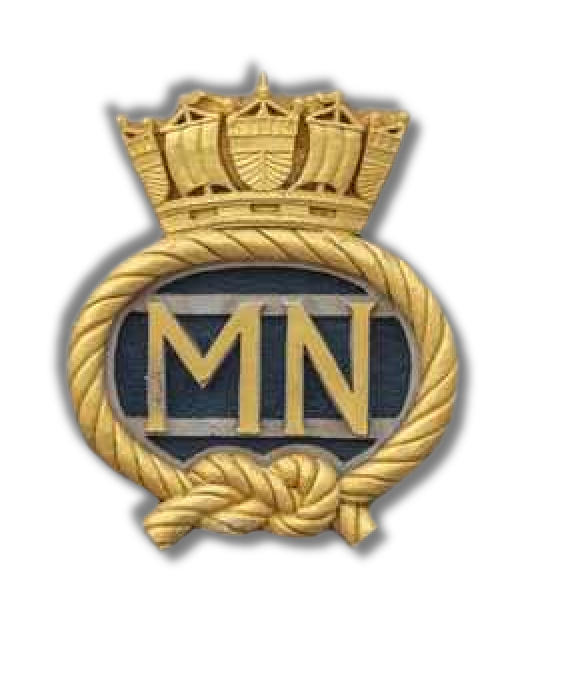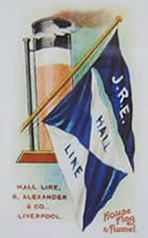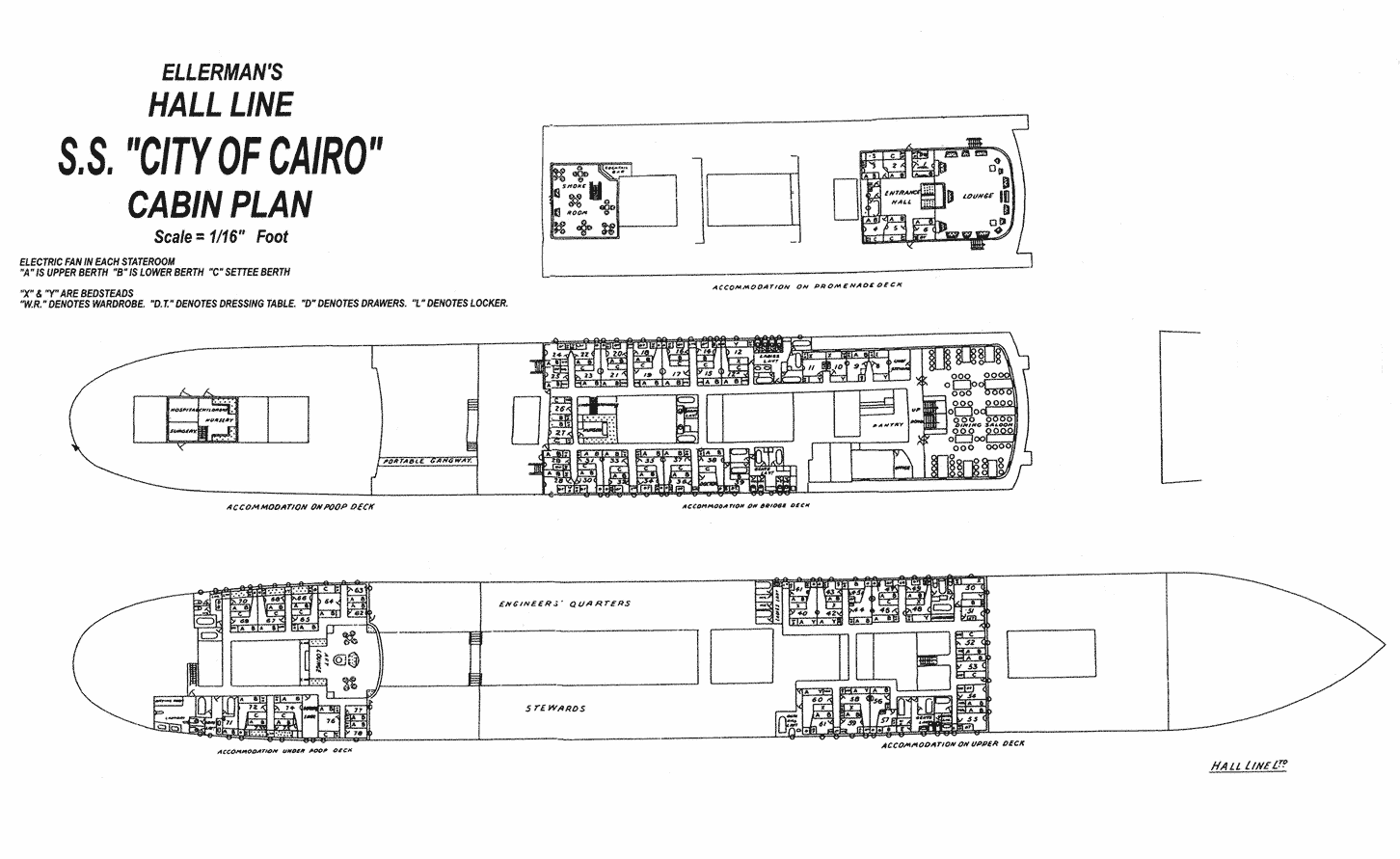Dr. Douglas W. Quantrill
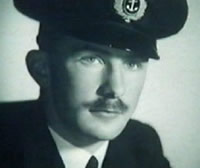
Dr. Douglas W. Quantrill
Dr. Douglas Walter Quantrill was born in Litchfield in 1916. He qualified on the eve of the Second World War and entered service in the Merchant Navy as a medical officer. He joined the "CITY OF CAIRO" on 19 September 1940, serving aboard for over two years until 6 November 1942 when the ship was torpedoed and sunk in the South Atlantic Ocean. He spent a fortnight in an open boat before rescue by the "CLAN ALPINE" in sight of the island of St Helena. This is his account of the sinking and his journey in lifeboat No.5.
I am very grateful to Sarah Quantrill for her father's account below.
An account by Dr. Douglas Quantrill
I had served in the Ship for over 2 years, and my last night on Board was much the same as many other nights. I was sitting at the head of my table talking to the passengers who sat with me having after dinner coffee. It was a pleasant evening, and we were just sailing into the Tropics. On my right sat Joan, we called her Joan Crawford, because she was rather like that famous Actress, and on my left Diana, who we used to call Blondie much to her annoyance, and amongst the others were Tom who was a Chief Officer from another Ship travelling as a passenger and Bill who was also a ship's Officer travelling home on sick leave. We were all in excellent spirits, the saloon was brightly lit, and I must have considered it a special occasion because I was smoking a cigar, The Indian Stewards dressed in the Indian style were busy clearing away or bringing in after dinner liqueur, and we had just completed an excellent dinner. We had no worries because we considered that we were at present out of the danger area, and were busy discussing the Sports tournaments which had commenced that day. Little did we know that shortly Joan would be swimming about in the Ocean, with her baby son; that Diana was to spend 37 days in a Lifeboat, and then be picked up by a German ship when she would afterwards die, or that Tom would be claimed as a hero by the Sunday Express for his work in yet another boat, or that I should be destined to spend 14 days in an open boat after which to be stranded on the Island of St. Helena for 3 months.
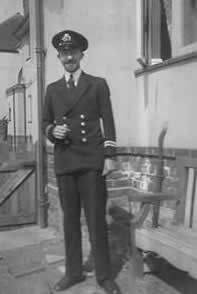
Dr. Douglas W. Quantrill
Courtesy of Sarah Quantrill
The War seemed miles away, but suddenly we were brought face to face with grim reality. Without warning, a torpedo shattered its way into the side of the Ship, with a sickening crack, the ship shuddered and the lights went out. I made my way to my cabin and picked up my life jacket, first aid bag and torch. On the promenade deck the lifeboats were quickly filling up, but there was no panic. I then made my way to the Engine Room in case there were any casualties but fortunately the torpedo had missed that part of the Ship, and everyone was quite safe. I then returned to by Cabin to collect one or two more things and returned to my Lifeboat where I was promptly told that there was no more room, as it was full up. Fortunately the Chief Engineer came along at that moment, and said there would be plenty of room. As he had already experienced being torpedoed several times before, I had no hesitation in taking his advice, and we both jumped over into the boat which eventually picked up yet 12 more people. We had lost 2 of our 8 lifeboats so that all the boats were overcrowded, and we packed 57 men, women and children into ours. Everyone was busy picking up survivors from rafts and from the water, and our boat and the others were sitting watching the ship go down, when a dark shadow appeared ahead of us. As it came closer, we recognised it as the Submarine. We could not see the area on her deck, and her guns were manned pointing menacingly at us. At first I thought they were about to ram us, but they stopped their engines and came alongside. A voice asked us in English who we were, where we were bound for, and if we had any prisoners of war. Then much to our surprise, he told us the direction and distance of the nearest land, wished us good night and disappeared. That night all 6 boats got together, and in the morning the Captain held a conference and decided that we should try and make for St. Helena nearly 500 miles away. For the first 24 hours there was no wind, and we were obliged to row which enabled us to cover a distance of only 20 miles that day. In view of the distance we had to go the small supply of food and water for our overcrowded boats our task seemed hopeless at that rate. The next day the wind got up, and we were able to make more progress but on the third night we ran into bad weather. The little boats were getting swamped, and we had to try and make use of our sea anchors and heave to. None of us could sleep as we were continually getting soaked, and it seemed that at any minute we should capsize, and be flung into the water. After that we were more fortunate, as far as the weather was concerned, but after a week 4 of the boats were missing. One was eventually picked up by a German ship, one was picked up off S. America with only 2 survivors alive a lady passenger and the 3rd officer, after 51 days afloat, a third was picked up and taken to S. Africa and the fourth was found by a ship bound for St. Helena. The two remaining boats due to wonderful navigation by the second Officer reached St. Helena, and were picked up in sight of the Island.
On the twelfth day I remember having a confidential talk with the Captain, as I was in charge of the food and water rations and he told me I must keep them down to the minimum because our chance of reaching the Island depended on the success of our navigation, which was calculated on the time of his watch at the time sights were taken. If his watch was two minutes out we should be 30 miles off our course, and could not possibly see the Island at that distance. As he had been swimming about in the water with his watch on it seemed a lot to expect for it to be dead right after 12 days without being corrected. On the 13th night I must admit, I had given up all hope of seeing land again. Several men and one woman had already died, and we all looked very weak. As dawn came somebody said that they thought they could see something that looked like land, but most of us thought it was only wishful thinking. However, we all sat and studied the dark clouds on the horizon, and there was definitely one dark line that never altered its shape at all, and appeared to get clearer as the dawn broke. Then the other lifeboat sent up a flare, and we knew that they had seen it as well, but we still dare not start on our remaining food and water. Suddenly a ship was sighted heading towards us, and we knew we were safe. That afternoon we were landed at St. Helena and I had the finest meal I have ever enjoyed in my life. It was a boiled egg with bread and butter and large cupfuls of beautiful hot tea.
Prior to Captain Rogerson leaving St Helena on 12th December 1942, aboard the ss "CHANTILY", he put the remainder of the survivors in the care of Dr. Quantrill.
Eventually TSS "NESTOR" was diverted to St Helena and the remaining survivors bar one where embarked. After a long and eventful voyage they arrived safely in Liverpool on 5th April 1943.
A letter from Capt. Rogerson
The following is a letter written by Captain Rogerson on the day he left St Helena:
Island of St. Helena. South Atlantic. 12th December 1942.
TO WHOM IT MAY CONCERN:-
To certify that Dr. Douglas W. Quantrill has been serving aboard the S-S. "City of Cairo" from September 1940 to November 6th, 1942 as ship's Surgeon. During this period he carried out his duties in an exemplary manner and was always respected by passengers and crew.
The "City of Cairo" was sunk by enemy action on 6th November 1942, and his services during the thirteen days which passengers and crew afterwards spent in open boats were of an outstanding character.
W.A. Rogerson. Master, S-S "City of Cairo".
A letter by Miss E.A. Birchman
Extract from a letter received by the Hall Line Ltd. Liverpool, from Miss E.A. Birchman, survivor ex the "City of Cairo", dated 21st April 1943.
"As a survivor of the S.S. "City of Cairo" I would like to take this opportunity of expressing my grateful thanks to the Hall Line for all the kindness and consideration shown to me during my stay on the Island of St. Helena.
At the same time too I would like you to know how well Dr. Douglas W. Quantrill, Surgeon ex "City of Cairo", performed his duties as Officer in Charge at St. Helena. It was no easy task but what befell him to do he did most willingly. On the T.S.S. "Nestor" he did very excellent work with regard to clothing for us, and I, like a great many more, am exceedingly grateful for his medical attention and his innumerable kindness."
HALL LINE LTD. LIVERPOOL 3rd May. 1943.
A letter from the Hall Line
A letter dated 8th December 1943 from the Hall Line.
Dr. Douglas W. Quantrill, Dalemere, Lichfield Road, Four Oaks, WARWICKSHIRE.
Dear Sir,
We are glad to learn that official recognition of your good services in connection with the sinking of the "City of Cairo" has been made, your name having been included in the list of commendations, and we wish to offer you our congratulations on this well merited Honour.
Yours faithfully, HALL LINE LTD.
Dr. Douglas Walter Quantrill died on 26 August 2001 very much missed by all his family and friends.
